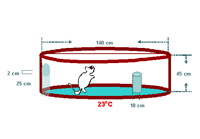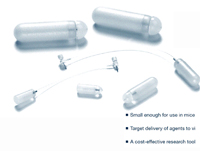

 |
|||
|
::: Professor Tzu-Ming Pan's Research Team Confirmed that Monascus Could
|
|
After years of animal experimentation, Professor of Microbiology Tzu-ming Pan and his research team, have proven that the fermented products of Monascus possess anti-oxidation, anti-inflammatory functions and the capability to inhibit the deposition of amyloid protein in Alzheimer's disease patients. They have also confirmed that Monascus is an useful ingredient in delaying the deterioration process of the Alzheimer's disease patients and in improving their memory learning ability. This series of groundbreaking findings have been published in the internationally renown "Journal of Neuroscience Research" and attracted wide attention from medical circles worldwide!! Professor Pan's research team conducted a series of researches on Monascus and its relations with the Alzheimer disease. They injected amyloid protein into the hippocampus of hamsters, making the hamsters become inflicted with Alzheimer's disease. Then they divided the hamsters into groups, and injected amyloid protein into these hamsters for 28 consecutive days. Finally, the researchers compared the group which had been fed with one dose and five doses of red yeast rice produced from NTU 568 strains with the other group of hamsters which had not been fed with any red yeast rice in terms of their memory and learning capability. The research results indicate, that the hamsters which have taken red yeast rice prove to be smarter, and know to shun away from danger. They are also better at reference memory and working memory, and can find their targets in a relatively shorter time. Anatomy of these hamsters' brains showed that the deposits of amyloid protein are significantly less in the brains of the hamsters which had been fed with red yeast rice containing Monascus. |
 Passive Avoidance Test Equipment  Water maze test equipment. The water maze contains a circular water reservoir, in which is placed a mobile platform for resting  Minimotors for injecting amyloid proteins. The size of these minimotors are roughly the size of ordinary capsules |
Although their brains were damaged by amyloid proteins nevertheless, the Monascus ingredients in the red yeast rice played a protective role, preventing the fibrosis of the amyloid proteins, and helped to reduce the deposition of the amyloid proteins in the hippocampus of the hamsters' brains. The research team also found that Monascus could enhance the genesis of neuro-protective agents, and improve a person's memory learning ability. Thus, Monascus could prevent the Alzheimer disease from worsening caused by high cholesterol and high calorie eating habits. These findings were sequentially posted on the websites of ‘"Applied microbiology & Biotechnology" and received recognition from the editorial board of Journal of Neuroscience Research.
Professor Pan pointed out that, the Chinese people have used Monascus in their food and medicine for thousands of years. Monascus contains many physical attributes of metabolites, of which present studies have found monacolins, which are effective in lowering the synthesis of cholestrals, and GAGA, an amino acid effective in lowering blood pressure. In addition, Monascus contains antioxidants and multi-functional materials which can be used to prevent Alzheimer's disease. Judging by the doses used in the animal experiments, a human being needs only to take 2 grams of NTU 568 red yeast rice every day to stay healthy. NTU is at present conducting technological transfer with a view toward developing Monascus into a new type of health food in the near future.
Professor Pan also emphasized that, not all Monascus strains are good for protecting a person's health, different fermentation methods may affect their effectiveness. Monascus contains citrinin, an anti-bacterial substance which has a poisoning effect on the kidneys. Therefore, how to reduce the toxicity of the citrinin and improve the effective ingredients will be the key to the development of a Monascus based health food.
Copyright 2008 NTU Secretariat
No. 1, Sec. 4, Roosevelt Road, Taipei, 10617 Taiwan(R.O.C.)
Phone: +886-2-3366-3366 Fax: +886-2-2362-7651